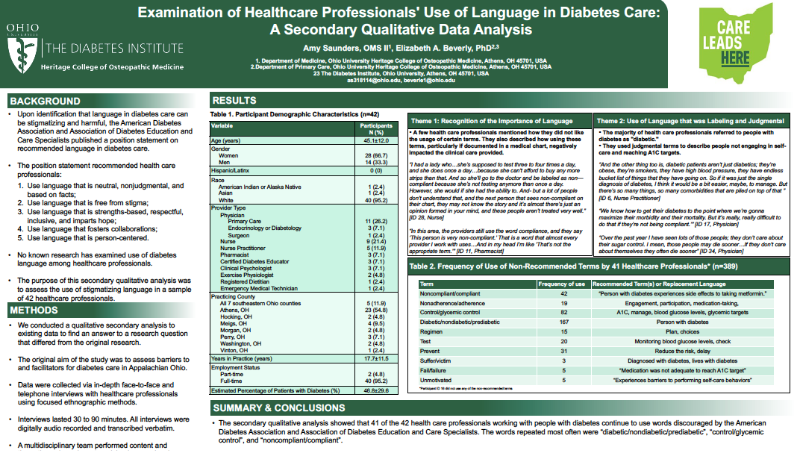
Leading through advocacy, education, and relationships
Examination of Healthcare Professionals' Use of Language in Diabetes Care: A Secondary Qualitative Data Analysis
Category: 2021
Author: Amy Saunders, OMS II, Elizabeth A. Beverly, PhD
Institution Affiliation: Ohio University: Department of Medicine, Department of Primary Care, The Diabetes Institute
Examination of Health Care Professionals’ Use of Language in Diabetes Care: A Secondary Qualitative Data Analysis Amy Saunders, OMS II, Elizabeth A. Beverly, PhD Background: The language used by health care professionals when speaking with and discussing patients is an important part of the health care process. Previous research has shown the need for a shift in the language used surrounding diabetes in clinical practice, but no known research has examined the frequency of use of these terms among health care professionals. Thus, the purpose of this secondary qualitative analysis was to assess the use of non-recommended language in a sample of 42 health care professionals. Methods: The multi-disciplinary team performed content and thematic analyses by re-coding key words, phrases, and texts using NVivo 12 software. Rigor was supported via investigator triangulation, participant corroboration, verbatim quotations, and inquiry audit to examine the research process. Results: The secondary qualitative analysis showed that 41 of the 42 participating health care professionals used non-recommended language in diabetes. These participants used non-recommended terms a total of 389 times throughout the interviews, with the terms “diabetic/nondiabetic/prediabetic”, “control/glycemic control”, and “noncompliant/compliant” used most frequently. Qualitative analysis revealed two themes: 1) Use of Language that was Labeling and Judgmental: The majority of health care professionals referred to people with diabetes as "diabetic." They used judgmental terms, such as noncompliant or unmotivated, to describe people not engaging in self-care and reaching A1C targets. 2) Recognition of the Importance of Language: A few health care professionals mentioned how they did not like the usage of certain terms. They described how using these terms, particularly if documented in a medical chart, negatively impacted how clinical care was provided. Conclusion: Findings from this secondary qualitative analysis clearly show that health care professionals continue to use non-recommended language when talking about people with diabetes. Thus, there is a need for more widespread education regarding the appropriate use of terms, especially in medical chart documentation.
Watch Video
 Phone: 567-712-0697
Phone: 567-712-0697
